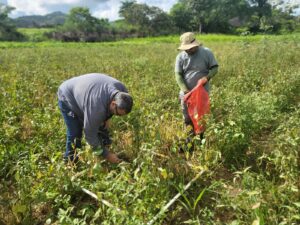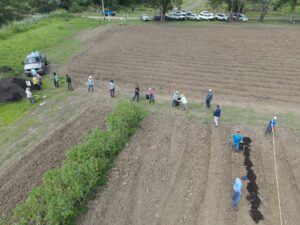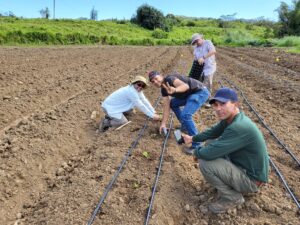Final report for SPR23-A001
Project Information
The scope of the proposed work is to educate and develop capacities and competencies using different learning methods to promote sustainable agriculture practices among extension faculty members and local farmers and producers. We will emphasize resilience as a tool for sustainable agriculture when facing the effects caused by climate change and the consequences of natural disasters. Puerto Rico depends on the importation of most of its food (85%), with the particularity of having first quality land and excellent weather conditions throughout the year favorable for the growth of multiple crops. We want to offer tools to all participants so that they obtain the skills and competencies to produce with greater economic viability in their operations and in harmony with the environment. As part of the learning strategies, the Puerto Rico Agricultural Extension Service (PRAES) will use the demonstration of methods, field days and excursions to show and encourage the implementation of sustainable practices to preserve natural resources for present and future generations.
The funds will be used to promote sustainable agriculture using different learning approaches and methodologies.
- Course in farm administration with an emphasis in sustainability components. This course is for farmers and ranchers, we estimate the participation of 30 local farmers and ranchers. This course will consist of six (6) different meetings to complete 30 contact hours. Educational resources will have mileage and per diem expenses covered. The topics that we are going to teach include:
- The Importance of the Agriculture Sector
- Risk Management in agribusiness
- Inventory
- Balance Sheet
- Pay roll and employer obligations
- Income and Expenses
- Cash Flow, Budget
- Basic concepts of Marketing
- Perspective of sustainable agriculture in programs of the PRAES
In the final day we will invite other government agencies to promote their programs, including USDA - FSA and NRC, PR Department of Agriculture, and share what SARE offers.
2. From Conventional to Sustainable - Transitioning Topics (New group). Through a questionnaire we will establish the level of knowledge, experience, and skills. Train the trainer’s capacity building will define sustainable agriculture, organic, agroecology, environmentally friendly, tropical, and the effects of climate change over agricultural production.
Process for sustainable certification – certified natural process – development of process by farmers from the ground up with support of PRAES Faculty. The topics are Soil fertility: Management, compost, cover crops, organic matter, chemistry, soil chemistry, physics, and biology.
Integrated Plague Management: natural and biorational plague management. Land and Water conservation techniques: engineering and agronomic. Seed production: local varieties. This initiative will last six days, including graduation and participant certification. It will provide 30 contact hours with classroom and field work. Participants will meet every three weeks. Participants consist of 15 Extension Faculty and 5 lead farmers. No more than twenty persons. Audience and educational resources will have mileage and per diem expenses covered.
3. The project will promote sustainable practices in the bean crop production for small producers. Bean crops are a valuable source of protein and fiber for the human diet. This crop is very popular in the Puerto Rico’s daily diet. The frequent consumption of string beans has many benefits for human health. In terms of sustainable practices, beans contribute to restore nitrogen to the soil and improve its quality. This crop also will be using as a rotational crop and cash crop given the opportunities to the producer to maintain an inflow and improve soil properties. To carry out this objective will be planning to establish two demonstrative fields. The first one at the Gurabo Experimental Station of the University of Puerto Rico and the other in a private farm (to be determined). The main objective of those demonstrative fields is to show and promote sustainable practices and the proper management in sustainability practices. We expect to increase the level of conscience in participants, using different demonstrative outreach methods. Extension faculty will have mileage and per diem expenses covered.
Advisors
- (Educator and Researcher)
- (Educator)
- (Educator)
Education
The educational approach focused on various interventions designed to foster learning and collaboration among the participants. These interventions included field days, where attendees could observe and participate in agricultural practices directly on the ground. Group discussions were also organized to promote the exchange of ideas and collective solutions to common challenges. Additionally, participants were encouraged to share their own experiences and knowledge, enriching collective learning and strengthening the community. This comprehensive approach aimed not only to impart knowledge, but also to create an environment of support and cooperation among all involved. It also aimed to reinforce and increase the participants' knowledge.
Education & Outreach Initiatives
Gaing in knowledge in sustainable agriculture
Training trainers and agricultural leaders involves covering various topics and defining key terms like sustainable agriculture, organic farming, agroecology, environmentally friendly practices, tropical agriculture, and others. It also includes understanding the effects of climate change on agricultural production. Some topics that be covered: Soil fertility management: This includes techniques such as composting, cover cropping, managing organic matter, and understanding soil chemistry, physics, and biology. Integrated Pest Management (IPM): This covers natural and birational methods for managing pests. By delving into these areas, trainers and leaders can gain a comprehensive understanding of sustainable agricultural practices and strategies for addressing environmental challenges while improving productivity and resilience in farming systems.
There has been an increase in knowledge and abilities on different topics, including Sustainable Agriculture and other agricultural concepts. This includes soil preparation, compost incorporation, installation of biodegradable plastic, and irrigation setup. Topics covered also include soil fertility, planting, fertigation, seed production including seedbeds, germination, and varieties. Additionally, conservation of land and water, Integrated Pest Management, crop monitoring, and the perspective of Sustainable Agriculture in Agricultural Extension Service programs have been discussed. Also, what is SARE (Sustainable Agriculture Research and Education).
Gaing in knowledge in farm administration
The topics that we teach are:
-
- The Importance of the Agriculture Sector,
- Risk Management in agribusiness,
- Inventory,
- Balance Sheet,
- Pay roll and employer obligations,
- Income and Expenses,
- Cash Flow, Budget,
- Basic concepts of Marketing,
- Perspective of sustainable agriculture in programs of the PRAES
The participants gained knowledge in all the topics covered and expressed that they found the topics related to risk management particularly useful, as these are unforeseen. They also stated that the topics of records, depreciation, marketing, and break-even point were very helpful to them.
Explain the many benefits that beans contribute
Beans are a nutritious, versatile, and environmentally friendly food that can be incorporated into a wide variety of dishes to enhance flavor and nutritional value. This crop also will be using as a rotational crop and cash crop given the opportunities to the producer to maintain an inflow and improve soil properties.
The primary objective of these demonstration fields is to showcase and promote sustainable practices and effective management techniques. We aim to raise awareness among participants through various demonstration outreach methods. Demonstrative plantings were conducted, during which participants learned about the benefits of growing beans. Additionally, educational materials related to bean cultivation were distributed. Comprehensive guidance was provided on the entire cultivation process, from planting to harvesting, along with potential marketing strategies. The aim of these activities is for farmers and participants to apply the knowledge they have learned on their own farms.
Educational & Outreach Activities
Participation summary:
Learning Outcomes
Project Outcomes
Face of SARE
We participate in various festivals and educational activities, what is SARE (Sustainable Agriculture Research and Education) was promoted and guidance was provided on the benefits it offers to farmers in terms of diverse opportunities. These activities included informational sessions, hands-on workshops, and presentations that highlighted how SARE can support farmers in implementing sustainable practices, accessing resources and funding, developing professional networks, and much more. The focus was on helping farmers understand how SARE can be an invaluable tool for improving the sustainability and profitability of their agricultural operations. Guidance was provided to individuals interested in and working on sustainable agriculture to strengthen the SARE Program in Puerto Rico. The goal is to integrate the efforts of various sectors in the agricultural area and direct those efforts toward sustainable agriculture.


